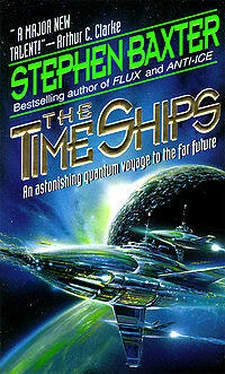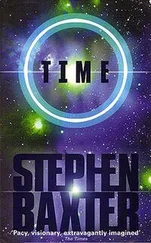I glanced back with longing at the Juggernaut, for within, I knew, was my Time Machine — my only possible way home, out of this unfolding nightmare of Multiple Histories — but I knew there was no prospect of reaching the machine now; all I could do was to wait on events.
We walked along Hill Street, and then turned into George Street. There was none of the bustle and elegance which had characterized this shopping street in my Year. The department stores, like Gosling’s and Wright’s, were boarded up, and even the planks which sealed up their windows had faded with years of sunlight. I saw how one corner of Gosling’s window had been pried open, evidently by looters; the hole that had been made looked as if it had been gnawed by a rat the size of a human. We passed a squat shelter with a beetling cover, and a pillar beside it with checkered markings and a glass face, now cracked. This too looked abandoned, and the bright yellow-and-black paintwork of the pillar was chipped and peeling.
“It is a shelter against air-raids,” Filby told me in answer to my query. “One of the early designs. Quite inadequate — if ever a direct impact had come… Well! And the pillar marks a first-aid point, equipped with respirators and masks. Hardly used, before the great retreat into the Domes began.”
“Air-raids… This is not a happy world, Filby, to have coined such terms.”
He sighed. “They have aerial torpedoes, you see. The Germans, I mean. Flying machines, which can go to a spot two hundred miles away, drop a Bomb and return! — all mechanical, without the intervention of a man. It’s a world of marvels, for War is a terrific motivation for the inventive mind, you know. You’ll love it here!”
“The Germans…” Moses said. “We’ve had nothing but trouble with the Germans since the emergence of Bismarck. Is that old scoundrel still alive?”
“No, but he has able successors,” Filby said grimly.
I had no comment to make. From my perspective, so detached now from Moses’s, even such a brute as Bismarck scarcely seemed to warrant the loss of a single human life.
Filby was telling me, in breathless fragments, of more of the marvelous Warfaring gargantua of this benighted age: of raider submarines, designed to prosecute the gas battles, with practically unlimited cruising range, and containing half a dozen missiles each, all packed with a formidable supply of gas bombs; of a torrent of ironmongery which I imagined tearing its way across the battered plains of Europe; of more “Juggernauts” which could go underwater, or float, or burrow; and all of it was opposed by an equally formidable array of mines and guns of all sorts.
I avoided Nebogipfel’s eyes; I could not face his judgment! For this was no patch on a Sphere in the sky, populated by abhuman descendants remote from me: this was my world, my race, gone mad with War! For my part, I retained something of that greater perspective I had acquired in the Interior of that great construct. I could scarcely bear to see my own nation given over to such folly, and it pained me to hear Moses’s contributions, bound up as they were by the petty preconceptions of his day. I could hardly blame him! — but it distressed me to think that my own imagination had ever been so limited, so malleable.
We reached a crude rail station. But this was not the station I had used in 1891 to ride from Richmond into Waterloo, through Barnes; this new construction was away from the center of the town, being located just off the Kew Road. And it was an odd sort of station: there was nothing in the way of ticket collection points or destination boards, and the platform was a bare strip of concrete. A new line was crudely laid out. A train waited for us: the locomotive was a drab, dark affair which puffed steam mournfully about its soot-smeared boiler, and there was a single carriage. There were no lights on the locomotive, nor any insignia of the governing Railway Company.
Trooper Oldfield pulled open the carriage door; it was heavy, with a rubber seal around the edge. Oldfield’s eyes, visible behind their goggles, flicked about. Richmond, on a sunny afternoon in 1938, was not a safe place to be!
The carriage was plain: there were rows of hard wooden benches — that was all — nothing in the way of padding, or any decoration. The paint-work was a uniform dull brown, without character. The windows were sealed shut, and there were blinds which could be pulled down over them.
We settled into our places, facing each other rather stiffly. The heat inside the carriage on that sunny day was stifling.
Once Oldfield had closed the door, the train started into motion immediately, with something of a lurch.
“Evidently we’re the only passengers,” Moses murmured.
“Well, it’s a rum sort of train,” I said. “Rather bare amenities, Filby — eh?”
“It isn’t much of an age for comforts, old man.”
We passed through some miles of the desolate sort of countryside we had seen around Richmond. The land had been given over almost entirely to agriculture, it seemed to me, and was mostly deserted of people, although here and there I saw a figure or two scraping at some field. It might have been a scene from the fifteenth century, not the twentieth — save for the ruined and bombed-out houses which littered the countryside, with, here and there, the imposing brow of bomb shelters: these were great carapaces of concrete, half-submerged in the ground. Soldiers with guns patrolled the perimeters of these shelters, glaring at the world through their bug-faced gas-masks, as if daring any refugee to approach.
Near Mortlake I saw four men hanging from telegraph poles by a road-side. Their bodies were limp and blackened, and evidently the birds had been at them. I remarked on this horrifying sight to Filby — he and the soldiers had not even noticed the presence of the corpses — and he turned his watery gaze in that direction, and muttered something about how “no doubt they were caught stealing swedes, or some such.”
I was given to understand such sights were common, in this England of 1938.
Just then — quite without warning — the train plunged down a slope and into a tunnel. Two weak electric bulbs set in the ceiling cut into operation, and we sat there in their yellow glow, lowering at each other.
I asked Filby, “Is this an Underground train? We are on some extension of the Metropolitan Line, I imagine.”
Filby seemed confused. “Oh, I imagine the line has some Number or other…”
Moses began to fumble with his mask. “At least we can be shot of these terrible things.”
Bond laid a hand on his arm. “No,” she said. “It isn’t safe.”
Filby nodded his agreement. “The gas gets everywhere.” I thought he shuddered, but in that drab, loose outfit of his it was difficult to be sure. “Until you’ve been through it—”
Then, in brief, vivid words, he painted a picture of a gas raid he had witnessed in the early stages of the War, in Knightsbridge, when bombs had still been tipped by hand from floating balloons, and the population was not yet accustomed to it all.
And such ghastly scenes had become commonplace, Filby implied, in this world of endless War!
“It’s a wonder to me that morale hasn’t cracked altogether, Filby.”
“People aren’t like that, it seems. People endure. Of course there have been low moments,” he went on. “I remember August of 1918, for instance… It was a moment when it seemed the Western Allies might get on top of the damn Germans, after so long, and get the War completed. But then came the Kaiser’s Battle: the Kaiserschlacht, Ludendorff’s great victory, in which he smashed his way between the British and French lines… After four years of Trench War, it was a great breakthrough for them. Of course the bombing in Paris, which killed so many of the French general staff, didn’t help us…”
Читать дальше
Конец ознакомительного отрывка
Купить книгу









